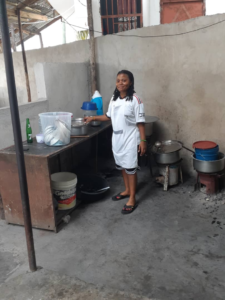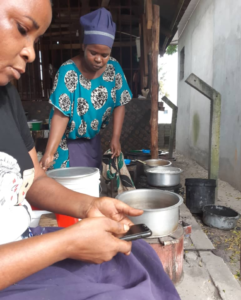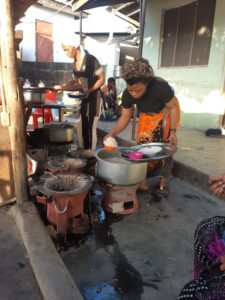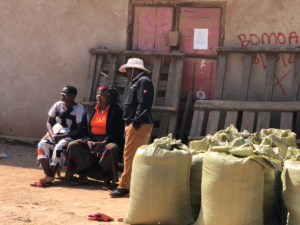Point-of-Sale Launches with Two Food Stalls as Its Initial Customers
 Dar es Salaam, 2024-05-21. “People here in Dar demand good and affordable staple foods produced by small farmers in the villages,” explains Queen Bahati, a young female entrepreneur. However, deliveries from the rural areas are currently delayed. Heavy rains have made the dirt roads impassable. For instance, the massive bean harvest stuck in Idete could only be picked up by small trucks, and later than expected. Even worse, one transport vehicle slid into a ditch, resulting in injuries and beans lost in the mud!
Dar es Salaam, 2024-05-21. “People here in Dar demand good and affordable staple foods produced by small farmers in the villages,” explains Queen Bahati, a young female entrepreneur. However, deliveries from the rural areas are currently delayed. Heavy rains have made the dirt roads impassable. For instance, the massive bean harvest stuck in Idete could only be picked up by small trucks, and later than expected. Even worse, one transport vehicle slid into a ditch, resulting in injuries and beans lost in the mud!
Queen Bahati has taken over Fatuma Sadiki’s food stall in Dar es Salaam on her own account, and she is setting up the nearby point-of-sale on behalf of the trading company TBM. This sales point is a key element in the fair-trade concept and has started with two food stalls as its initial customers—a growth in very small steps.
 Fatuma, meanwhile, has relocated to a different site. This new location, right next to the headquarters of the Bajaj Cooperative for three-wheeled taxis, has great potential for attracting new regular customers and spreading word-of-mouth about the sales point’s product offerings. However, supplying the sales point remains critical: repairs reduce truck trips, and collecting goods from the farmers suffers due to the poor condition of the dirt roads. Finding solutions is challenging and causes headaches, as many options get stuck in the complex web of dependencies and unpredictability.
Fatuma, meanwhile, has relocated to a different site. This new location, right next to the headquarters of the Bajaj Cooperative for three-wheeled taxis, has great potential for attracting new regular customers and spreading word-of-mouth about the sales point’s product offerings. However, supplying the sales point remains critical: repairs reduce truck trips, and collecting goods from the farmers suffers due to the poor condition of the dirt roads. Finding solutions is challenging and causes headaches, as many options get stuck in the complex web of dependencies and unpredictability.
The earnings from the first two months of the sales point’s operation indicate that the initial purpose was well-conceived: achieving fair prices for farming families and affordable prices for food stalls through direct sales of potatoes, corn, and beans. Nevertheless, a lot of scouting and experimentation is needed to economically stabilize and further develop the interconnected initiatives around the point-of-sale.
HEAVY RAIN BLOCKS THE TRANSPORT OF THE POTATO HARVEST
 Dar es Salaam, 2024-02-16 “I could sell everything that is delivered from my homeland, the southern highlands, at the Darajani market in Dar,” says Queen Bahati, a young, proactive woman. “People here demand good staple foods, and small farmers in the villages produce them.” However, deliveries from the interior of the country are currently being cancelled because unusually heavy rains have made the dirt roads completely impassable. As a result, the potato harvest, which weighs tonnes, remains blocked at the collection point in Idete, for example.
Dar es Salaam, 2024-02-16 “I could sell everything that is delivered from my homeland, the southern highlands, at the Darajani market in Dar,” says Queen Bahati, a young, proactive woman. “People here demand good staple foods, and small farmers in the villages produce them.” However, deliveries from the interior of the country are currently being cancelled because unusually heavy rains have made the dirt roads completely impassable. As a result, the potato harvest, which weighs tonnes, remains blocked at the collection point in Idete, for example.
Queen Bahati runs a small cookshop in Dar es Salaam with an assistant. She plans to run the point-of-sale right next door, which will need to be supplied regularly. The storage space has already been rented, but the supply of the transshipment point with “transport-by-schedule” from the interior of the country is proving to be a considerable problem.
As therefore Queen faces a lack of income from the operation of the point-of-sale, she wants to expand the cookshop with a chip stand, and also purchase a fridge to compensate for this. In March, she applied to farip for a small loan with monthly repayments.
farip supports innovation in rural areas and targeted attempts to improve the income of farming families in Tanzania with new business ideas. Small farmers are increasingly focusing their business ideas on fair trade and their own transport chain – without intermediaries – from the collection points in the highlands to the points of sale, and on direct marketing in the city. farip plays the role of both a microcredit bank and a coach and advisor to help these proactive people move forward.
COOKING UP A CONCEPT FOR FAIRER FOOD LOGISTICS

The first point of sales outlet for agricultural products from the inner country is being built here in Makambako
Dar es Salaam, 2022-10-28. Anyone who travels in Tanzania knows a “Mama Ntilie”. It’s the local name for the women who produce cheap meals for the workforce. They cook on the streets, outside industrial and port facilities or at construction sites. Due to a lack of cash and storage facilities, they often have to buy food daily from retailers at very high prices. Fatuma from Kigamboni is a Mama Ntilie who depends on these expensive suppliers. She can’t buy in bulk.
Fatuma and countless other inhabitants in the large urban centres form by far the largest market for agricultural products in Tanzania. So: What if the food supply from rural areas could run through a separate network of outlets specializing in selling small amounts of goods – in ideal portions for those city clients?
Bahat Tweve has devoted a lot of time to tackling this challenge. He and his trading company Tanzania Biashara Mapema (TBM) have been farip partners for years. So far, however, a practical problem has got in the way. “The inability to secure reliable and regular transport over huge distances between producers and outlets has hindered our success”, Bahat explains. Fatuma works in Dar es Salaam, 800km away from some of the farmers who grow what she and the other Mamas cook. Everybody in that long value chain would benefit from fair and transparent trade.
TBM recently designed a solution. The aim is to set up small warehouses along the route of the Scheduled Cargo Service SCS, which is co-funded by farip. The truck can stop briefly and unload ordered goods. Customers like Fatuma could store their supplies there and pick them up according to their daily cooking needs. Such outlets could develop into a form of small logistics centre for many clients. SCS would help ensure reliable and regular deliveries.
To test such a “Point of Sale” concept, farip and TBM are negotiating a grant for three pilot sites. Two would be in Dar and along the route to Makambako. The third is planned for Ruaha Mbuyuni, an important regional trading town in the southern highlands. Ruaha Mbuyuni lies on the main road between Iringa and Morogoro; dirt roads stretch out to villages growing irrigated onions and tomatoes. Mbuyu (baobab trees) grow in the forests. Bahat plans to launch the third “Point of Sale” there once those in Dar es Salaam and Makambako are up and running.
Every “Point of Sale” aims to provide assured quality, reliable delivery and safe and hygienic storage. If all goes well, Fatuma and her fellow Mamas should be very happy cooks. And their customers will benefit as well.
